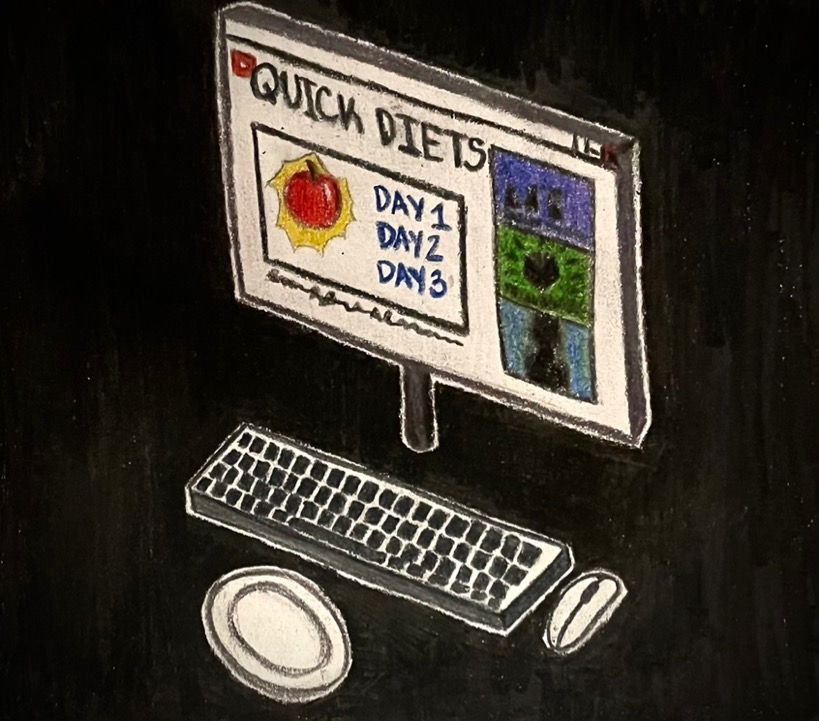Diet Culture Promotes Eating Disorders
In a world where the media is dominated by thin and seemingly perfect individuals, it is easy to fall into a trap of “get thin quick” diets. These diets are displayed everywhere: at the grocery store, on television, in gyms, in stores. Advertisements of shocking “before and after” pictures and low-calorie stamps can give people ideas that just being healthy is not enough: they must restrict and change their lifestyle for the sake of looking thinner.
Many diets are perfectly safe for people to try out and stick to. However, certain “miracle diets” and calorie tracking apps use methods of weight loss that inhibit or promote eating disorders. While many individuals may be perfectly fine using these diets, the methods these programs use often do not work long term. For a person wanting to truly get healthier, fast working diets are not the answer.
One method these diets often use is the tracking of calorie and food intake. This seems like a nice tool to stay organized and determine what one would need to cut out in the day. However, it is extremely easy to get caught up in the calorie count of each food and start avoiding eating it, even if it is relatively nutritious and healthy. Individuals could even stop eating altogether, under the mindset that if they are not eating any calories but still burning them, they would lose more weight.
This mindset could lead to the development of anorexia nervosa, a disorder that can leave someone very malnourished and sick. Many people have also developed bulimia – a disorder in which a person forces themself to throw up after eating – with the mindset that the calories do not count if they are not fully digested.
These diets have this effect most prominently on teenagers. According to Oliver-Pyatt Centers (oliverpyattcenters.com), “Among people aged 14 and 15 years, dieting was the strongest predictor of eventually developing an eating disorder.” They also stated that “14- and 15-year-olds who engaged in extreme dieting were 18 times more likely to eventually develop an eating disorder than non-dieters. Similarly, 14- and 15-year-olds who engaged in moderate dieting were five times more likely to develop an eating disorder than non-dieters.”
Junior Kate Chiulli understands that although these diets could potentially help people, they could harm them just as much. “While diets such as these may help people lose weight, the obsession over counting calories and keeping track of every single thing you eat definitely has the potential to negatively impact one’s mental and physical health,” Chiulli said.
Many calorie-tracking apps also will give a person a set number of calories for the day. When making an account, it prompts users to input their physical information: age, height, weight, gender. Then, the app calculates how many calories that person should eat in a day and shows them how many they “have left” after they input something they ate or drank. This is a seemingly harmless way to see how much a person should be eating. However, it is not uncommon to see low calorie counts (1,200 or lower) being recommended, which can be unhealthy for many individuals.
Bigger calorie deficits start to be a problem when an individual cannot sustain themselves through the day. When a person is not eating as much as they should, they will become tired faster and not have the energy to function in their day-to-day life. Not to mention, they will be hungrier and start to crave the foods they are dieting from more than ever before. Calorie deficits like these can often lead to a binge eating disorder, in which a person goes a long period of time without eating and then consumes a large amount of food without the ability to stop eating.
According to the A Workout Routine website (aworkoutroutine.com), when people start large calorie deficit diets, “the hunger and appetite issues get worse, and a breaking point is eventually reached. And when that breaking point is reached, a massive binge (sometimes lasting for days) takes place.”
Since this diet is not a sustainable way to lose weight, people often end up either losing the weight and gaining it back, or just not losing weight in the first place. A person is better off just eating in moderation and exercising. It is not a quick fix, but it is a healthy way to sustain weight loss.
Freshman Jillian Weston agrees that fast-working diets can promote eating disorders. “It can alter your diet and make you think that if you eat this way your weight will magically decrease,” Weston said. “When the programs don’t work right away and make you lose weight, it can lead to depression and low self-esteem, as well as make you think anorexia and bulimia are better options.” She believes that working with a trained nutritionist is an effective way to seek weight loss options.
Calorie counting aside, many diets claim that certain foods should be completely removed from one’s diet. Of course, some foods have more nutritional value than others, but all foods in moderation should not really have any effect on a person’s physical health. Yet, diet culture leads the public to believe that certain foods should be cut completely to lose weight.
A very popular example of this is low-carb diets. Even though they are seen to the public as evil, carbohydrates are a primary way for the human body to energize quickly. Although cutting out carbs will help to lose weight quicker, the weight loss will be difficult to sustain, since a person will have little energy, a harder time exercising, and a multitude of stomach and digestive issues due to eating more proteins and fats.
The belief that some foods are “good” and others are “bad” is simply false. The truth is, foods with less nutritional value are not always inherently bad for people. Most times, moderation is the solution to problems that may arise when eating these so-called “bad foods.” There is no point in completely cutting a certain food or food group out of a diet.
Of course, not everyone agrees that these diets are promoting disordered eating. Sophomore Aubrie-Lynn Wilkonski thinks that dieting programs are simply doing what they are designed to do. “I think that fast-working diets are not promoting eating disorders because I think these programs give you a specific healthy diet to follow so you can lose weight and eliminate any of the junk food that you eat,” Wilkonski said. She argues that what diet companies are doing does work and does not encourage disordered eating.
Overall, when diet decisions are going to be made, it is best to talk to a medical professional about the exact regiment a person should follow. Everybody is different; something that works for one person might not work for the next. It is also important to remember to not take dieting to the extreme. Diet culture loves to tell people that to lose weight, they must go to some extreme, but all it takes for most people is a well-balanced, healthy diet paired with exercise. It may not give results in weeks, but it is sustainable and keeps a person happy and healthy, which is more important in the long run.

I am a member of the Class of 2024 as well as a managing editor for Horizon. I like to write, read, sing, and act. One fun fact about me is that I love...


















